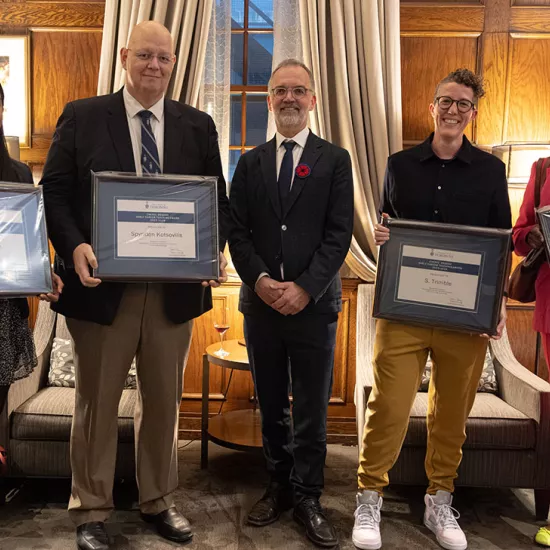Ethnic identity and voting are timely focus of UTM professor’s new book

“Elections are the Super Bowl for political scientists,” says Randy Besco, an assistant professor, tenure stream of political science at UTM and author of the recently published book, Identities and Interests: Race, Ethnicity, and Affinity Voting (UBC Press).
Elections are also a Petri dish for research, and this book allows Besco to focus his political scientist’s lens on ethnic identity and how it plays out at the ballot box. Using survey research, experiments and both candidate and Census data, Besco made several interesting discoveries: voters from ethnic minorities who identify with their own minority group support candidates from that group, and these same voters are also more likely to support a candidate from another ethnic minority, rather than one from the white majority.
“Canada is full of people from all parts of the world, and minorities are more likely to support minority candidates,” he says. If there is no candidate from your minority running, “you do get cross-ethnic identification and voting. You see that you have something in common; voters say, ‘This candidate is a minority or an immigrant like me.’”
Besco says this pattern may be particularly relevant to the upcoming federal election, where Jagmeet Singh of the New Democrats is the first non-white candidate to lead a federal political party.
“Ethnicity was an important factor when he was elected party leader,” Besco says. “Indo-Canadians came out in big numbers to support him. I expect it to happen on a larger scale during the federal election.”
Besco notes that the tendency for cross-ethnic voting is crucial for candidates in cities like Toronto where most ridings have voters with a mix of ethnicities, since “a political coalition of many minorities provides more power.”
His findings argue for the value of nominating more minority candidates because they attract votes. Their candidacies go beyond tokenism; they offer benefits to their political parties.
The book affirms the existence of a white/non-white electoral divide.
“People often accuse white Canadians of thinking of minorities as all one group, despite their distinctiveness,” Besco says. “It turns out that immigrants and minorities can also see themselves as having something in common, and this affects their political choices.”
Understanding the propensity for immigrants and minorities to identify with their own group is important to a nuanced understanding of voting patterns and motivations.
“It isn’t really about specific interests or policies,” Besco says. “There’s not much evidence that immigrants and minorities vote for candidates because of what they are going to get in return. Instead, it’s strongly contingent upon how much they self-identify with their ethnic group. For some people, ethnicity isn’t a big part of their identity, but for others, it’s vital to their sense of who they are.
“It’s not because they want to see some sort of payoff; they want to see someone from their group winning. They can share in that victory. Even if it's not a specific policy payoff, the psychological value is very real. Wanting your group to be respected and successful is natural for everyone, and one way that can happen is winning elections and sitting in Parliament.”
Besco likens this tendency to nationalistic behaviour during the Olympics. Every couple of years, people find themselves watching sports to which they rarely give much thought and cheering for Canadians to succeed. When they win, the country wins, too. That drives a deep emotional response, leading to an enormous investment of money, effort, and media coverage – just like in politics.
The book derives from observations Besco first made during Canada’s years under Tory Prime Minister Stephen Harper as he watched then-minister Jason Kenney make appeals to minority Canadians in an attempt to win their support for the Conservative Party.
“This made it clear to me that immigrants and minority Canadians were an important group of people politically, but nobody talked about them as politically important actors,” Besco says. “I thought it was something that needed to be pursued.
“The book uses Canadian data and looks at Canadian groups, but the arguments I make are much more generally applicable.”



